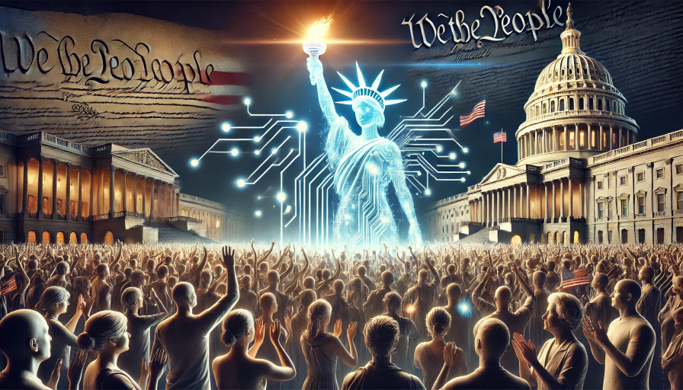Empowering Grassroots Movements with 21C Tools
A book project led by Ralph Hughes.
What fascinates us about this project? Well…
We’re using AI to research and report upon how to use AI to ward off the harm from AI that many AI experts are warning us about.
That makes the project pretty recursive and therefore deeply fascinating.
We’ll post our work-in-progress and chapters here as they reach successive checkpoints in the development process.
The People’s AI:
Introduction
Part I: The Predicament
1. The Threat of Oligarchy Powered By AI
2. AI’s Potential for the Common Good
3. Solutions Require Political Will
Part II: An AI Platform for the People
1. KFC-A Method Behind the Platform
2. Knowing: Democracy Platforms That Work
3. Finding: RAG as a “Truth Averager”
4. Changing: Use Deep Research for Action Plans
Part III: Getting Our Platform Built
1. The Bootstrap Team
2. The Demo-Funding Cycle
3. Swaying The Political Parties
4. Maintaining Integrity As We Grow
Supplemental Materials
Track the Book’s Progress by Chapter
Project Approach
Start with the thesis.
Identify and use AI to search for recent works with similar and counter orientations.
Identify the “unresolved edge” of the thesis that requires further research before we can express an opinion.
Identify an AI-assisted method for translating research into first-draft material.
Identify & use an AI-powered method of critiquing first-draft material.
Send material to human reviewers for comments.
Project Status
Step 2b: Use AI to search for recent works with similar and counter orientations.
Book’s Thesis
AI is here, accelerating, and will change society for decades to come. Ominously, the rich and powerful currently control its development and usage, the same rich and powerful who now cows the government and who have given us an Internet widely reviled for its commercialism and its pernicious influence. For this reason, ordinary people should expect the implementation of AI to be—at best—the familiar blend of amazing capabilities wrapped with so many downsides that we’ll doubt whether the technology is a net benefit for humanity.
But AI has the potential for liberating everyone and dramatically removing the drudgery of everyday life. Why shouldn’t that be the polar star AI development moves toward, and why shouldn’t those blessing be widely shared with everybody?
Ordinary people have not only a stake in how AI gets deployed, but a latent degree of ownership in the technology, given that AI is trained upon the store of human knowledge and was developed through government-funded programs.
Unfortunately, we cannot count on either the corporations or the government to shepherd AI in the direction that would be best for common person. So, we—the masses—need to participate in determining the arc of this technology, which means elbowing our way into the conversation and gain a seat at the table. Luckily, we can use AI to assist us in both coalescing ourselves into a potent, public voice and then swaying the direction of the regulatory process. This book focuses upon using AI to accomplish those two ends.
Findings: Similar and Countervaling Recent Works
We used AI to search for recent works with similar and counter orientations. Here’s what it found.
